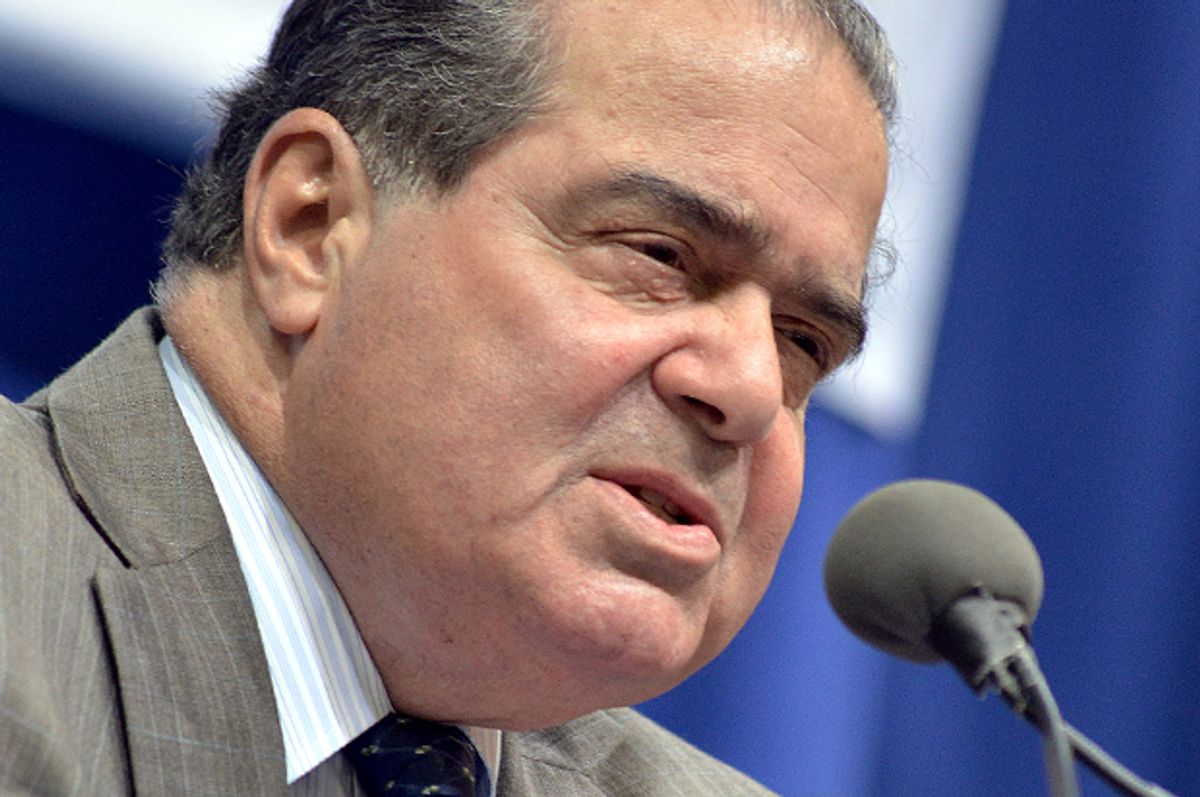During oral arguments in Wednesday’s Supreme Court case considering the constitutionality of the University of Texas at Austin’s admissions policies, Justice Antonin Scalia had this to say:
There are those who contend that it does not benefit African Americans to get them into the University of Texas, where they do not do well, as opposed to having them go to a less-advanced school, a slower-track school where they do well. One of the briefs pointed out that most of the black scientists in this country don't come from schools like the University of Texas. They come from lesser schools where they do not feel that they're being pushed ahead in classes that are too fast for them.
It’s obvious that Scalia framed his comments, as he is increasingly prone to do, in as offensive a way as possible -- at least in a context in which it is still considered unacceptable to use the N-word. Whether he did so because of encroaching senility, or because he has fully embraced what kids these days refer to as a DGAF attitude toward what his audience might think, remains difficult to say.
Something that has been obscured by the outcry over Scalia’s rhetoric is that this argument – that affirmative action is bad for its putative beneficiaries because it pushes them into settings where they will be less likely to excel – is, from a legal standpoint, completely irrelevant to the issue before the Supreme Court.
That is because the legal issue in the case is whether affirmative action programs such as that being employed by the University of Texas are unconstitutional, not whether they are a good idea. Right wing-critics of judicial activism, and most particularly Justice Scalia, love nothing more than to lecture liberals about this distinction.
Lots of government programs might or might not be desirable as a matter of public policy, but that question, we have been told over and over again, has nothing to do with whether the Constitution forbids the government from enacting them. If there is anything on which all conservative critics of the American legal system agree, it is that good laws are not identical to constitutionally permissible laws, and to confuse these two categories is the essence of the judiciary’s illegitimate usurpation of the legislative role.
A second principle to which the vast majority of these critics also swear allegiance is that what is constitutionally permissible should be determined by the original meaning of the Constitution, not by the manipulation of that document into some sort of “living text,” whose meaning changes over time.
Now actually adhering to these principles would, in practice, be a huge problem for conservative critics of affirmative action. That is because arguments for the claim that the original meaning of the equal protection clause of the 14th Amendment – the part of the Constitution that opponents of affirmative action claim invalidates such programs – forbids all preferential treatment on the basis of race are extremely weak.
Indeed, from a historical perspective, the claim that courts ought to use the 14th Amendment to strike down democratically adopted affirmative action programs looks like the rawest sort of judicial activism. It is, in other words, exactly the kind of thing conservatives have spent the last several decades decrying, whenever it resulted in the invalidation of laws they liked.
Now that this same procedure is being used to invalidate laws conservatives don’t like, what used to be “judicial activism” suddenly becomes enforcing the constitutional rights of discriminated-against Americans -- in this case, white people -- against the mob rule of biased legislatures.
That Justice Scalia can reconcile his supposed opposition to judicial activism and his supposed fidelity to originalist interpretation with his willingness to declare affirmative action programs unconstitutional is a nice illustration of the human mind’s ability to tolerate cognitive dissonance, and the human soul’s ability to tolerate rank hypocrisy.

Shares